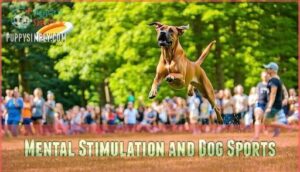This site is supported by our readers. We may earn a commission, at no cost to you, if you purchase through links.

They’re fiercely loyal to family but need consistent training and plenty of exercise to channel their energy. Don’t let their gentle nature with kids fool you – they’re natural protectors with a stubborn streak that’ll test your patience during training sessions.
Health-wise, watch for hip dysplasia and that ridge-specific dermoid sinus condition that smart owners screen for early.
Table Of Contents
- Key Takeaways
- Rhodesian Ridgeback Breed Overview
- Temperament and Personality Traits
- Health Considerations and Care Needs
- Exercise Requirements and Activities
- Training and Socialization Best Practices
- Frequently Asked Questions (FAQs)
- Are Rhodesian Ridgebacks good with small children?
- How much exercise does a Rhodesian Ridgeback need?
- Are Rhodesian Ridgebacks prone to any specific health issues?
- Do Rhodesian Ridgebacks get along well with other dogs?
- What is the average lifespan of a Rhodesian Ridgeback?
- What are Rhodesian Ridgeback puppy costs beyond purchase?
- How do Ridgebacks handle apartment living situations?
- Are Rhodesian Ridgebacks good for first-time owners?
- What climate conditions suit Ridgebacks best?
- Do Ridgebacks have specific dietary restrictions or allergies?
- Conclusion
Key Takeaways
- You’ll need serious commitment – These 70-85 pound former lion hunters require at least one hour of daily vigorous exercise and consistent training to manage their stubborn, independent nature.
- They’re excellent family protectors but need early socialization – Your Ridgeback will be fiercely loyal and gentle with your kids, but their natural wariness of strangers means you’ll need to start socializing them as puppies.
- Health screening is crucial – You’ll want to test for hip dysplasia, hypothyroidism, and dermoid sinus (a ridge-specific condition) since these issues commonly affect the breed.
- They’re not ideal for first-time owners – Their strong-willed personality and powerful build demand experienced handling, though they’ll reward your dedication with 10-12 years of unwavering loyalty.
Rhodesian Ridgeback Breed Overview
You’ll discover the Rhodesian Ridgeback is a powerful, athletic breed originally bred to hunt lions in Africa, weighing 70-85 pounds with their signature backward-growing ridge of hair.
These intelligent dogs make excellent family companions but need consistent training and plenty of exercise to channel their strong hunting instincts.
History and Origin as a Hunting Dog
You’ll discover the Rhodesian Ridgeback’s African origins trace back to Khoikhoi hunting dogs crossed with European breeds by early settlers. These South African breeders developed the African Lion Hound for big game hunting, using specialized hunting techniques to track lions. This breed development created today’s fearless Rhodesian Ridgeback through careful selection. They’re considered South Africa’s only indigenous dog breed.
Physical Characteristics and Appearance
You’ll find these powerful dogs impressive in person. Male Rhodesian Ridgebacks stand 25-27 inches in HEIGHT and weigh around 85 pounds, while females reach 24-26 inches and 70 pounds. Their muscular build reflects their hunting heritage.
The COAT showcases various wheaten COAT COLOR variations, from light to red tones. Their athletic frame demands minimal grooming needs – just weekly brushing keeps them looking sharp.
Unique Ridge Feature and Coat Colors
The Rhodesian Ridgeback’s signature ridge of fur creates their unique identity. This narrow band grows backward along their spine, inherited through ridge genetics from African hunting dogs.
Their coat color ranges through wheaten shades from light wheat to deep red. Ridge imperfections can occur but don’t affect the dog’s health. Color fading happens naturally with age, requiring minimal grooming colors maintenance.
Breed Popularity and Famous Owners
Celebrity owners like David Bowie, Errol Flynn, and Patrick Swayze helped boost breed recognition. Their media representation as loyal family dogs appeals to owners seeking devoted companions.
The Rhodesian Ridgeback ranks 41st in AKC popularity trends, showing steady appreciation for their balanced temperament. This celebrity influence highlights the breed’s unique personality traits that make them excellent household pets.
Temperament and Personality Traits
You’ll find your Ridgeback combines fierce loyalty with a surprisingly gentle nature around family members.
This breed’s moderate energy levels and strong protective instincts make them excellent watchdogs, though their stubborn streak means you’ll need patience during training sessions.
Family Compatibility and Protective Instincts
Your Ridgeback naturally bonds with family members while maintaining watchful instincts. These protective dogs balance affection with alertness, making excellent family dogs when properly socialized.
- Guarding Tendencies: Strong protection instinct without aggressive behavior
- Family Integration: Devoted temperament creates lasting household bonds
- Instinct Management: Early socialization shapes appropriate protective responses
- Child Interaction: Natural gentleness requires supervised introductions and boundaries
Behavior With Children and Other Pets
These gentle giants form strong bonds with family members and usually show excellent child interaction when properly socialized. Their temperament naturally makes them patient with children, though their size requires careful monitoring during play sessions.
Your Ridgeback’s protective instincts mean supervised play is essential, especially with toddlers. Pet compatibility depends on proper socialization—most family dogs adapt well to household cats and other pets when introduced early.
Energy and Playfulness Levels
Balancing moderate energy levels with bursts of enthusiasm, your Rhodesian Ridgeback needs structured Daily Activity to thrive. Exercise Variety keeps them engaged, from hiking to fetch sessions.
Their Play Style varies with Age Differences—younger dogs crave more vigorous Mental Stimulation while adults prefer steady routines. Mental Enrichment through puzzle games satisfies their hunting instincts.
Daily Exercise requirements aren’t overwhelming, but consistency matters for ideal Energy level and Playfulness level balance.
Stubbornness and Trainability
Working with these independent thinkers requires patience and creativity. Your Rhodesian Ridgeback’s temperament includes natural stubbornness, making training challenges inevitable.
Consistency importance can’t be overstated—mixed messages confuse them. Reward-based training and motivation techniques work better than force.
Higher-level obedience and off-leash control demand persistent effort. Smart dog behavior means they’ll test boundaries, but proper Rhodesian Ridgeback training builds mutual respect.
Health Considerations and Care Needs
You’ll want to stay on top of your Ridgeback’s health needs since they’re prone to hip dysplasia, hypothyroidism, and a unique condition called dermoid sinus that affects their signature ridge.
Rhodesian Ridgebacks face hip dysplasia, hypothyroidism, and dermoid sinus—a ridge-specific condition requiring vigilant health monitoring
Regular vet checkups, proper nutrition with 2.5 to 4.5 cups of quality food daily, and weekly brushing will keep your loyal lion hunter in top shape for their 10-12 year lifespan.
Common Health Problems (hip Dysplasia, Hypothyroidism, Dermoid Sinus)
While your Ridgeback’s loyal nature shines, genetic predisposition creates specific health problems you’ll need to watch. Hip dysplasia risks affect 5% of the breed, causing joint pain and mobility issues. Hypothyroidism symptoms include weight gain and coat problems from autoimmune thyroiditis. Dermoid sinus detection requires checking for tubular skin tracts that need surgical removal.
Preventative measures include health screenings before breeding. Regular vet visits can help with Rhodesian-Ridgeback health concerns.
Nutrition and Feeding Guidelines
Every Rhodesian Ridgeback thrives on quality nutrition suited to their size and age. Feed your dog 2.5 to 4.5 cups daily, split into two meals to prevent bloat.
Large-breed puppy nutrition promotes proper growth, while senior diets address changing needs. Weight management prevents joint stress.
Some dogs develop food allergies requiring specialized diets. Raw feeding works for some owners, but balanced commercial foods meet most nutritional needs effectively.
Life Expectancy and Recommended Health Screenings
Your Ridgeback’s lifespan averages 10-13 years with proper preventative care. Longevity factors include genetics and weight management.
Rhodesian Ridgeback health screening costs cover hip and elbow dysplasia, autoimmune thyroiditis, and dermoid sinuses. Annual cardiac evaluations detect genetic predispositions early.
Regular veterinary visits substantially improve quality of life, catching health issues before they impact your dog’s golden years.
Grooming and Coat Care Essentials
How simple can grooming get? Your Rhodesian Ridgeback’s coat care couldn’t be easier. Weekly brushing controls moderate shedding while distributing natural oils. Monthly bathing keeps them fresh unless they’ve found mud.
Don’t forget nail trimming every few weeks, weekly ear cleaning, and daily dental hygiene. This low-maintenance grooming routine keeps your ridgeback healthy and comfortable.
Exercise Requirements and Activities
Your Ridgeback needs at least one hour of daily exercise to stay physically and mentally healthy, as these athletic dogs were bred for endurance hunting.
Jogging, hiking, swimming, and interactive play sessions work best to channel their natural energy and prevent destructive behaviors.
Daily Exercise Needs and Suitable Activities
Your Rhodesian Ridgeback needs substantial daily exercise to thrive. Plan for at least one hour of vigorous activity, adjusting exercise intensity based on age and weather considerations. Young dogs require gentler sessions to protect developing joints, while adults can handle jogging and hiking. Activity variety prevents boredom and promotes joint health.
- Morning jogs become your shared ritual – building an unbreakable bond through miles of adventure
- Fenced yards transform into personal playgrounds – where your ridgeback’s wild spirit runs free
- Weather-adapted activities show your dedication – proving love means consistency through every season
Mental Stimulation and Dog Sports
Beyond physical exercise, your Rhodesian Ridgeback needs mental challenges to stay sharp. Puzzle toys keep their hunting instincts engaged while you’re away.
Agility training builds confidence and strengthens your bond. Scent work leverages their natural tracking abilities.
Canine disc and lure coursing satisfy their chase drive perfectly. These dog sports prevent boredom and destructive behaviors.
Safe Environments and Fencing Recommendations
Your Rhodesian Ridgeback needs secure boundaries to contain their high prey drive and escape artist tendencies. Install six-foot fence height with material durability that withstands determined jumps. Add digging prevention barriers buried twelve inches deep.
These protection dogs require indoor safety measures too—secure gates and sturdy crates prevent household mishaps. Proper fencing reinforces effective training and regulates natural hunting behavior.
Training and Socialization Best Practices
You’ll need to start training your Ridgeback puppy early, as these strong-willed hunters can become stubborn without consistent guidance.
Early socialization helps your Ridgeback feel comfortable around strangers, since their natural protective instincts make them reserved with new people.
Importance of Early Socialization
You’ll want to start puppy exposure early with your Rhodesian Ridgeback since their natural temperament can lean reserved. Proper socialization prevents fear-based behaviors and builds confidence around strangers.
Focus on developing social skills and bite inhibition through controlled interactions. Your dog’s protective instincts need balanced training to guarantee they’re well-adjusted family companions rather than overly suspicious guardians.
Positive Reinforcement Techniques
Training your Rhodesian Ridgeback thrives on reward timing and motivation strategies. These intelligent dogs respond best when you reward immediately after correct actions.
Use clicker training for precise communication during shaping behavior sessions. Focus on positive reinforcement through treats, praise, and play to build strong dog behavior patterns.
Avoid punishment completely—it damages their temperament and trust.
Managing Behavioral Concerns
Why does your Ridgeback suddenly turn into a four-legged tornado? Understanding Rhodesian Ridgeback behavior challenges helps create harmony at home. These intelligent hunters need proper training and socialization to channel their instincts positively.
- Destructive Chewing: Redirect energy with puzzle toys and consistent exercise
- Excessive Barking: Use reward-based training to teach "quiet" commands
- Resource Guarding: Practice "leave it" during feeding sessions
- Leash Reactivity: Gradual exposure with positive reinforcement works best
Obedience Classes and Ongoing Training
Professional obedience classes provide structured environments for your Rhodesian Ridgeback’s ongoing training journey. Higher-level Obedience builds on basic commands, while Agility Training channels their athletic nature.
Consider Canine Good Citizen certification to showcase proper dog behavior. Scent Work utilizes their hunting instincts naturally.
Trick Training keeps sessions engaging through reward-based training methods that work best with this intelligent breed.
Frequently Asked Questions (FAQs)
Are Rhodesian Ridgebacks good with small children?
These dogs can be wonderful with small children when properly socialized. Their gentle nature shines with family members they know well.
You’ll want to supervise interactions since they’re large and energetic.
How much exercise does a Rhodesian Ridgeback need?
A tired dog is a good dog. You’ll need at least one hour daily of vigorous exercise – brisk walks, jogging, hiking, or dog sports keep these athletic hounds happy and healthy.
Are Rhodesian Ridgebacks prone to any specific health issues?
Yes, you’ll want to watch for hip dysplasia, hypothyroidism, eye problems, and dermoid sinus. These breeds also face bloat risks due to their deep chests, so smaller meals help.
Do Rhodesian Ridgebacks get along well with other dogs?
Ridgebacks generally get along well with other dogs when properly socialized from puppyhood. You’ll find they’re devoted family dogs who usually coexist peacefully with household pets and canine companions.
What is the average lifespan of a Rhodesian Ridgeback?
Like medieval knights who valued longevity, you’ll find these majestic hounds usually live 10-12 years.
Their lifespan depends on proper health screening, quality nutrition, and regular vet care to prevent common issues like hip dysplasia.
What are Rhodesian Ridgeback puppy costs beyond purchase?
Budget around $170-$395 monthly for food, vet care, grooming, and supplies after your puppy comes home. Don’t forget pet insurance ($40-$70 monthly) to protect against unexpected health issues.
How do Ridgebacks handle apartment living situations?
Picture a caged lion – that’s apartment life without proper exercise. They’re couch potatoes indoors but need space to stretch comfortably. You can make it work if you’re committed to **two hours of daily outdoor activity.
**
Are Rhodesian Ridgebacks good for first-time owners?
First-time dog owners should think twice about choosing this breed. You’ll face training challenges with their stubborn streak and strong-willed nature. They’re powerful dogs requiring consistent leadership and extensive socialization.
What climate conditions suit Ridgebacks best?
You’ll find these dogs thrive in moderate climates. They handle warm weather well but struggle with extreme cold.
Their short coat means you’ll need extra care during harsh winters or freezing temperatures.
Do Ridgebacks have specific dietary restrictions or allergies?
While they don’t have breed-specific dietary restrictions, your Ridgeback might develop food allergies or hypothyroidism. Watch for skin issues or digestive problems that signal sensitivities to certain proteins or grains.
Conclusion
Owning a Rhodesian Ridgeback is like partnering with a gentle giant who carries the heart of a lion. This breed demands respect, patience, and commitment from day one.
You’ll find their loyalty runs deeper than most dogs, but their independent streak means training requires consistency and positive reinforcement.
With proper socialization, exercise, and health monitoring, your Rhodesian Ridgeback will reward you with years of devoted companionship and unwavering protection for your family.
















